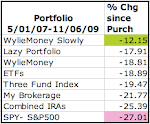If you a bought mutual fund in the last few years, chances are good, you're looking at a loss in that fund. If you've sold some equities for a profit, earned income this year or your fund paid a capital gains distribution or dividend, chances are good you owe taxes.
Did you know you can lower your taxes by selling your fund at a loss, if you hold it in a taxable account (not a 401k or 403b or IRA account)?
You might say "But wait a minute, Wylie! Buying high and selling low is a terrible investing strategy. If I sell my fund and the markets rally tomorrow, my calm will be seriously damaged."
"Whooooaaaaaa nelly..." is how I would respond. I don't think you should get out of the market while the markets are down.
What I am going to do (and what you may want to consider doing, if it makes sense given your situation) is look at the funds I own and sell a fund at a loss when I can find an equal or better fund in the same category that I can buy on the same day I sell. That way I remain 100% invested. I'll actually buy more in some categories and less in others to re-balance a bit, but you get the idea.
You might ask, 'what's the catch?'
There are several things to be aware of! The biggest catch is the Wash Sale rule. You can read a good detailed explanation of this here. Basically if you sell one security (for our purposes, this includes mutual funds, ETFs, or ETNs) and buy a "substantially identical" security within a certain number of days, you can't take the tax loss.
My understanding of this rule is that if you sell an index fund and replace it with a different fund that tracks the same index, you are likely to run into this. But if you sell a managed fund and replace it with an index fund, or vice versa, the investment strategies are fundamentally different. Even selling one managed fund and replacing it with another should be fine (but I'm not an accountant so do your own homework), assuming the managers dont use the same analysts/strategy, etc.
One risk is that the new fund you buy may not do as well as the old fund, but since we can't predict fund performance, I find this risk negligible. It is just as likely the new fund will do better, but that is not the reason to make the change. Expenses, turnover, and proven success from the manager and fund company are the best criteria for finding a solid fund to add to a taxable account, so if there are other good options out there, and you are sitting on a fund with a solid loss, why not take the loss and buy the new fund so that you remain invested in the category you want represented in your portfolio?
Other issues to consider...
Issue:
When you sell a mutual fund, the money from that transaction won't be available for several days so you need additional cash to buy a different fund on the same day. If I sell $2000 from Fund X and want to put $2000 into Fund Y, I'll need $2000 in cash in addition to the $2000 in fund X ($4000 total) in my brokerage account to buy and sell on the same day.
Solution:
If you have an emergency fund, you can use it to pull this off. Once all the cash from your sell orders are posted, you can put that back in your emergency fund. The downside is that you won't have that cash for a few days and if the market tanks after you place your sell order, you may end up with less $ than you planned.
Issue:
Your basis on the new purchase will be calculated on the day you buy. So if the markets rally back to where they were when you bought in and you sell, you'll owe taxes. You would not owe taxes if you simply hold on and the market rebounds and you sell at the same level you originally bought in at.
Solution:
There is none. If you make a profit in a taxable account, you owe taxes. Quit complaining and pay your patriotic share!
Keep in mind that it could take a while for markets to recover and that the tax rate on capital gains can't go much lower but it can go higher. So saving money now, means more money in your hands now to invest. If you save money on taxes and invest it, you'll have a bigger stake in the market which is a good thing if it does rally. Sure you'll owe taxes later (unless you come up with some other plan like this one) but you'll owe it on bigger profits than you would otherwise make and making bigger profits is kinda the point of investing.
Issue:
If I just bought a fund or invested in one, many funds charge a fee for selling right away and some brokerages, like Etrade which I use, charge their own fee, for selling no load, no fee funds (they charge a fee on no fee funds- hahahaha) if you sell in 3 months.
Solution:
Do your research. If you are going to be socked with fees, even thought you already lost a lot of value on a fund you just purchased, this plan may not make sense. You may want to wait until the required amount of time passes, to avoid any fees. So you don't get the tax write-off this year, you planning to not earn any income next year? You think the markets will rally 40% in the next 3 months?
Issue:
You have many many thousands of dollars in losses and no gains. How much will this really help?
Solution:
Talk to you accountant. You can write off up to $3000.00 against your income each year and losses carry forward so if you have gains or income next year, it is my understanding the loss you did not apply against your gains this year will apply nxt year and so on until you run out. But the longer it takes to reap the benefit, the more other issues come into play. If the market rallies next year, the unused tax savings may not be worth the new tax obligation you're now holding. Of course this depends on how long you plan to hold the funds...
Issue:
The fund you bought had a $2500 minimum initial purchase amount. You've lost $1000 in that fund. The better fund you found also has a $2500 initial minimum purchase amount, but you only have $1500 invested in this fund category. You'd have to add another $1000 to this category to buy the new fund.
Solution(s):
Add another $1000, pick a fund with a lower initial minimum or don't sell.
Summary:
If you have capital gains from this year- many funds that are down for the year still paid out capital gains distributions in the last few weeks and you WILL owe taxes on those distributions regardless of whether you sell or not- or earned some income, then this is worth considering. You'll need extra cash and you'll need to find equal or better funds to buy.
I can't help you with the extra cash, but I will share which funds I'm selling and which funds I'm replacing them with... I hope it helps!
12.28.2008
Making Lemonade Out of Lemons: Profiting from Mutual Fund Losses
Labels:
Investing,
Mutual Fund,
Non-Retirement,
Taxes
Subscribe to:
Post Comments (Atom)



2 comments:
You need to mention the wash sale rules.
Anonymous, your point is solid. I added info about the wash sale rule.
Post a Comment